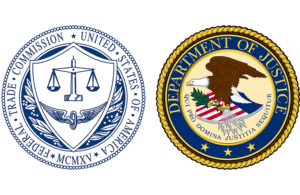 Last year, the Biden administration drafted an executive order that promoted competition in the U.S. economy across several industries, including pharma and biotech. The focus on the pharma industry was not surprising, given Biden’s campaign pledge to curb drug pricing. To that end, the Biden administration has explored a variety of approaches, Robin Adelstein, the global head of antitrust and competition and co-head of commercial litigation, U.S. at Norton Rose Fulbright.
Last year, the Biden administration drafted an executive order that promoted competition in the U.S. economy across several industries, including pharma and biotech. The focus on the pharma industry was not surprising, given Biden’s campaign pledge to curb drug pricing. To that end, the Biden administration has explored a variety of approaches, Robin Adelstein, the global head of antitrust and competition and co-head of commercial litigation, U.S. at Norton Rose Fulbright.
In November, the FTC signaled its intent to provide guidance for enforcement of the FTC Act, passed in 1914, to regulate monopolies and eliminate unfair competition and deceptive business practices.

Robin Adelstein
“For a long time, the FTC Act has been interpreted as being coextensive with the antitrust laws,” Adelstein said.
In 2015, FTC released the Statement of Enforcement Principles Regarding ‘Unfair Methods of Competition’ Under Section 5 of the FTC Act to clarify its thinking on what constituted unfair competition. But on July 2021, FTC Commissioner Lina Kahn withdrew that statement, arguing that the 2015 statement hampered the agency’s ability to “identify and combat unfair methods of competition even if they do not violate a separate antitrust statute.”
“What the FTC said is that they are going to look at a whole bunch of different conduct that could give rise to a claim that might fall short of an antitrust claim,” Adelstein said.
Some of the areas the FTC decided to focus on are loyalty discounts as well as bunding and tying arrangements. “This area has been an area that hasn’t had a lot of focus previously,” Adelstein said. “I know that it is an area of concern for any companies involved in the distribution of products and also an area that the pharma companies use quite a lot.”
Loyalty discounts are common in the life sciences industry, but there has not historically been a lot of government enforcement in this area. “You need to be careful about how you challenge a discounting program because, typically, they’re helpful programs,” Adelstein said. “But the government is concerned about entrenching a monopolist in a powerful position so that others can’t compete.”
In addition, SEC has signaled its intention to scrutinize companies that serially make small acquisitions that might fly under the radar. While this is most common in the tech sector, it could also create problems in the pharma industry. One concern is that companies with an existing product could acquire a smaller firm with a potentially competitive product to squash potential future competition. “This applies in the tech area where the government has a pretty good focus, but it also applies strongly in the pharma space,” Adelstein said.
Another focus of the Biden administration is price discrimination, where companies discriminate against various purchasers on price at different times. “The government hasn’t brought a price discrimination case in over 20 years, and the FTC has specifically called out price discrimination of potential areas focus,” Adelstein said.
Finally, the U.S. government is also focusing on reverse-payment settlements, which refer to an agreement between a branded drug manufacturer and a generic competitor. “The government has challenged what they call ‘pay-for-delay deals,” Adelstein said. Such deals involve a brand pharmaceutical company making payments to a generic company to keep a generic off the market.
The Supreme Court ruled in 2013 in FTC v. Actavis that a large and unjustified payment from the brand to the generic to delay generic entry is unlawful or anti-competitive. “There’s been a lot of litigation since that case about what constitutes a large and unjustified payment and what is and isn’t permitted,” Adelstein said.
California also passed legislation in January 2020 in California that makes any presumptive payment unlawful. “The California legislation tried to remove any of the defenses that the pharmaceutical companies might have in cases like this,” Adelstein said.
That statute also applies damages or liability of $20 million for anyone who aids and abets in the settlement agreement. “There are many concerned people about this area and California’s attempt to regulate reverse payment settlements,” Adelstein said.
“I think that’s part of the statute that will ultimately end up being challenged as an excessive fine,” Adelstein said.
Ultimately, there has been a considerable amount of antitrust litigation under the Biden administration. “I counsel a lot in this area,” Adelstein said. “It is a big part of my practice. Any conduct by a branded pharmaceutical company intended to keep generics off the market is potentially subject to scrutiny.”